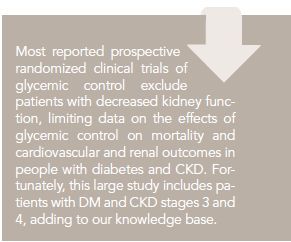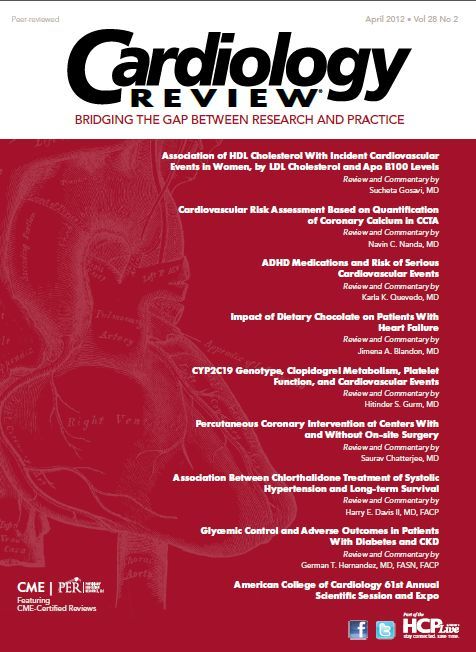Publication
Article
Cardiology Review® Online
Glycemic Control and Adverse Outcomes in Patients With Diabetes and CKD

German T. Hernandez, MD , FASN, FACP
Review
Shurraw S, Hemmelgarn B, Lin M, et al. Association between glycemic control and adverse outcomes in people with diabetes mellitus and chronic kidney disease: a population- based cohort study. Arch Intern Med. 2011;171:1920-1927.

Diabetes mellitus and chronic kidney disease (CKD) are strong risk factors for adverse cardiovascular outcomes and for the development of endstage renal disease (ESRD). Diabetic kidney disease accounts for the majority of cases of ESRD in North America and carriesa high risk of mortality. In both type 1 and type 2 diabetes, a glycemic control target of a hemoglobin A1c (HbA1c) level less than 7% reduces the development or worsening of diabetic nephropathy.1-4 However, the effect of intensive glycemic control (target HbA1c <6.5%) on the risks of mortality and cardiovascular events in type 2 diabetes remains controversial, with recent studies showing either an increased mortality risk or no benefit.4-6
Unfortunately, most reported prospective randomized clinical trials of glycemic control have excluded patients with decreased kidney function. Thus, there is very limited information available to examine the effects of glycemic control on mortality, cardiovascular, and renal outcomes in people with diabetes and CKD. Recently, Shurraw et al reported the relationship between glycemic control and adverse clinical outcomes in an observational clinical registry study of Canadian patients with diabetes and CKD stages 3 and 4.7
Study Details
The authors assessed the relationship between glycemic control and all-cause mortality, progression of kidney disease, cardiovascular events, and all-cause
hospitalization among patients with diabetes (type 1 or 2) and non—dialysisdependent CKD (estimated glomerular filtration rate [eGFR] between 15 and
<60 mL/min/1.73 m2).
Using data from the Alberta Kidney Disease Network and the Alberta provincial health ministry between January 2005 and December 2006, adult outpatients with diabetes and an eGFR between 15 and <60 mL/min/1.73 m2 were identified for inclusion in the cohort study. Patients were classified according
to their initial glycemic control by HbA1c level into 3 groups (HbA1c <7%, HbA1c between 7% and 9%, or HbA1c >9%). The primary study outcome was all-cause
mortality; additional outcomes of interest included all-cause hospitalization, cardiovascular events (myocardial infarction [MI], stroke, heart failure), progression of
CKD (as evidenced by a sustained doubling of the serum creatinine level), and new ESRD. Outcomes were determined until the study end-date of March 31, 2009.
A total of 23,296 adult patients with diabetes and non—dialysis-dependent CKD were included in the study. Most patients (n = 21,155) had CKD stage 3 (eGFR 30-59 mL/min/1.73 m2) and 2141 had CKD stage 4 (eGFR 15-29 mL/min/1.73 m2). Overall, 50.6% of patients had an initial HbA1c <7%, 38% had a HbA1c between 7% and 9%, and 11.4% had a HbA1c >9%.
After a median follow-up period of 46 months (and after adjusting for age, sex, income, and index eGFR) patients with CKD 3 or 4 and a HbA1c level >9% had a higher risk of death compared with patients with a HbA1c <7% (hazard ratio [HR], 1.35; 95% CI, 1.21-1.50). Similarly, the adjusted risks for all-cause hospitalization (HR, 1.44;
95% CI, 1.36-1.52), MI (HR, 1.85; 95% CI, 1.53-2.25), stroke (HR, 1.96; 95% CI, 1.56-2.47), heart failure (HR, 1.89; 95% CI, 1.61-2.21), doubling of serum creatinine (HR, 1.77; 95% CI,1.48-2.13), and new ESRD (HR, 2.52;95% CI, 1.58-4.02) were all higher for patients with CKD stage 3 and HbA1c>9% compared with patients with CKD stage 3 and HbA1c <7%. Among patients with CKD stage 4 and HbA1c >9% (compared with patients with CKD stage 4 and HbA1c <7%) there was a similarly higher risk for all outcomes; however, the risk for stroke (HR, 1.20;95% CI, 0.51-2.80), heart failure (HR,1.32; 95% CI, 0.88-1.98), and newESRD (HR, 1.13; 95% CI, 0.80-1.59)
were not significant.
Interestingly, the authors further analyzed the risk of death using the predictor variable of HbA1c modeled as a continuous variable (as opposed to cat-egorized into 3 levels only). These additional analyses showed a higher risk of mortality for HbA1c levels >8% and for HbA1c levels <6.5%, consistent with recent reports of intensive glycemic control in type 2 diabetes without CKD.5,6
In terms of the renal outcomes, the association between poor glycemic control (HbA1c levels >9%) and a higher risk of doubling of the serum creatinine level
was similar for both patients with stage 3 and stage 4 CKD. Also, the risk of new ESRD was higher for patients with poor glycemic control and stage 3 CKD
at baseline. However, the higher risk of new ESRD was of lower magnitude and not statistically significant for patients with poor glycemic control and stage 4
CKD at baseline.
References
1. Diabetes Control and Complications Trial Research Group. The effect of intensive treatment of diabetes on the development and progression of long-term complications in insulindependent diabetes mellitus. N Engl J Med. 1993;329:977-986.
2. DCCT/EDIC Research Group; de Boer IH, Sun W, Cleary PA, et al. Intensive diabetes therapy and glomerular filtration rate in type 1 diabetes. N Engl J Med. 2011;365:2366-2376.
3. UK Prospective Diabetes Study (UKPDS) Group. Intensive blood-glucose control with sulphonylureas or insulin compared with conventional treatment and risk of complications in patients with type 2 diabetes (UKPDS 33). Lancet. 1998;352:837-853.
4. ADVANCE Collaborative Group; Patel A, MacMahon S, Chalmers J, et al. Intensive blood glucose control and vascular outcomes in patients with type 2 diabetes. N Engl J Med. 2008;358:2560-2572.
5. Action to Control Cardiovascular Risk in Diabetes Study Group; Gerstein HC, Miller ME, Byington RP, et al. Effects of intensive glucose lowering in type 2 diabetes. N Engl J Med. 2008;358:2545-2559.
6. Gerstein HC, Miller ME, Genuth S, et al. Long-term effects of intensive glucose lowering on cardiovascular outcomes. N Engl J Med. 2011;364:818-828.
7. Shurraw S, Hemmelgarn B, Lin M, et al. Association between glycemic control and adverse outcomes in people with diabetes mellitus and chronic kidney disease: a population-based cohort study. Arch Intern Med. 2011;171:1920-1927.
8. National Kidney Foundation; Kidney Disease Outcomes Quality Initiative (KDOQI). Clinical practice guidelines and clinical practice recommendations for diabetes and chronic kidney disease. Am J Kidney Dis. 2007;49:S12-S154.
COMMENTARY
Glycemic Control and Adverse Outcomes in Patients With DM and CKD
The National Kidney Foundation’s Kidney Disease Outcomes Quality Initiative (KDOQI) clinical practice guidelines recommend that the target HbA1c for people with diabetes should be <7.0%, irrespective of the presence or absence of CKD.8
The issue with the KDOQI recommendation is that the majority of the clinical trials showing that glycemic control confers a renoprotective benefit (prevention of microalbuminuria and lowering progression to overt albuminuria) have excluded patients with reduced eGFR.1,3,5 Additionally, patients with more advanced CKD stages are at higher risk of developing severe hypoglycemia due to decreased clearance of certain oral hypoglycemic agents and insulin and from decreased renal gluconeogenesis.
There is a definite lack of evidence to guide glycemic treatment targets in patients with diabetes and advanced CKD. The study by Shurraw et al aims to begin to fill the void in the literature.7 To date, their study stands as the largest cohort of patients with non-dialysis-requiring diabetic kidney disease with reduced eGFR. Additional strengths of the study include the use of a well-established and methodologically rigorous population-based clinical registry in a setting where access to health care is universal. The authors were able to adjust for multiple important potential confounders and used clinical outcomes of importance—death, hospitalizations, cardiovascular events, and renal disease progression. The limitations of the study include its retrospective observational design, which cannot establish causality. There also exists the possibility of residual confounding including the level of blood pressure control, insulin use, and other clinical laboratory markers such as proteinuria and hemoglobin levels.
While all adverse outcomes were associated with higher levels of HbA1c (>9%), HbA1c levels lower than 6.5% were also strongly associated with a higher risk of death in patients with diabetes and CKD stages 3 to 4. This study is the first to add to our knowledge about the relationship between glycemic control and adverse outcomes in patients with reduced kidney function who are not on dialysis. While better glycemic control appears to be beneficial in patients with CKD stages 3 to 4, a more aggressive approach that targets near-normoglycemia may be associated with a higher risk of mortality—consistent with randomized trials
in diabetics without impaired renal function.5-7 Randomized trials specifically addressing intensive glycemic control in patients with diabetes and advanced CKD are needed to further test the results of this observational study. In the meantime, it seems a reasonable approach to target a HbA1c of no less than 7%.
About the Author
German T. Hernandez, MD, FASN, FACP, is chief of staff at the University Medical Center of El Paso and an assistant professor of medicine in the Divisions of Nephrology
& Hypertension and Biostatistics & Epidemiology at the Paul L. Foster School of Medicine, Texas Tech University Health Sciences Center in El Paso. Dr. Hernandez is the El Paso site principal investigator for many multicenter clinical trials.
